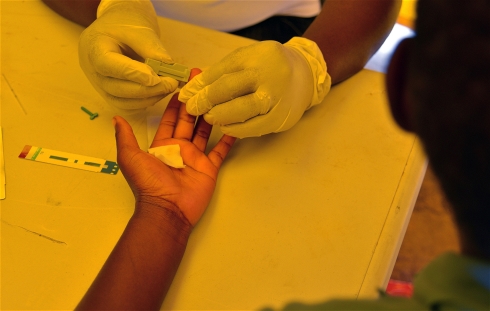Activists in Uganda, where HIV prevalence is on the rise, have warned that new legislation criminalising deliberate transmission of the virus will further undermine efforts to stem the Aids epidemic and erode the rights of those living with HIV.
As well as setting out fines and jail terms of up to 10 years for those found guilty of “willful and intentional” transmission, the HIV/AIDS Prevention and Control Bill, passed by Parliament on May 8 and now awaiting presidential assent, also obliges pregnant women and their partners to take HIV tests, and in some circumstances empowers health workers to unilaterally disclose a patient’s positive status to an at-risk partner or household member. It also obliges parents to tell their children of their status.
“Despite years of engagement and labouring to explain the dangers on an HIV-specific criminal law, Parliament has refused to be advised. When experts on HIV research and management attempted to speak, [lawmakers] still failed to heed to the key concerns,” Dorah Kinconco Musinguzi, executive director of Uganda Network on Law, Ethics and HIV/AIDS (UgaNet), told IRIN.
“If we have not managed to test 67% of Ugandans for HIV without a law that punishes transmission, will this number improve when citizens know that more legal burdens are added to testing? The answer is no. Will their behaviour improve because of this fear? No. Will we have helped the HIV situation then? No. We shall have more people transmit HIV in ignorance of their status. Laws do little to change behaviour, instead it takes behaviour underground,” she said.
Over the past five years HIV prevalence in Uganda has risen from 6.4% to 7.3%.
“The evidence from the Ugandan Ministry of Health shows clearly – criminalisation of HIV doesn’t work. It drives people away from services and fuels discrimination and fear,” Asia Russell of the HIV advocacy organisation Health GAP, told IRIN.

Alex Ario, the national co-ordinator of the ministry’s AIDS Control Programme (ACP), said “the Bill may not be that useful in my view. It does not add value to the current efforts. Actually, with dwindling support from donor communities to ACP as it is now, we would rather divert efforts to lobby government of Uganda to put more money for HIV activities rather than legislating against people with HIV.”
“We need to redirect legislative reform, and law enforcement, towards addressing sexual and other forms of violence against women, and discrimination and other human rights violations against people living with HIV and people most at risk of exposure to HIV,” he said.
Russell added that in conjunction with the Anti-Homosexuality Act, which passed into law in February 2014, this new law could lead “a sex worker apprehended for sex work, who is transgender and HIV positive, [to] be sent to prison for life.”
UgaNet’s Musinguzi said: “This [Bill] will hurt the women we have been encouraging to come up to take an HIV test such that they can have HIV-free children. But in this case, they will be forced to disclose their results and should they fear, and not do it in time, that means that they are potential candidates for [prosecution under] the Bill…
“There is high likelihood that justice will not prevail for the HIV-positive [people] found in this situation because of the high levels of stigma and condemnation that we have seen the HIV-positive go through,” she added.
More than 150 000 people are becoming HIV-positive every year; 1.5-million Ugandans are HIV-positive, according to Uganda Aids Commission statistics.
The Bill also flies in the face of the “rights-based” approach to HIV embodied in the regional HIV/AIDS Act passed in April 2012 by the East African Legislative Assembly.
Those in favour…
Meanwhile, some MPs have been defending the Bill.
“Every piece of legislation is to prevent mischief. The Bill is both [a] legal and moral thing. We want to reduce down HIV deliberate infections,” Medard Lubega Ssegona, opposition shadow minister for justice and constitutional affairs, told IRIN.
“The Bill will encourage more people to go and test for their good. It will compel two consenting adults to test before they engage to each other because of the sanctions of false disclosure,” he said, adding: “The deliberate infections have caused a lot of burden [on] our economy. The government spends a lot of money on treating and taking care of people who have [been] deliberately infected by people with bad hearts. This is going to stop.”
Olivia Kwagala Kabaale, a legislator from the ruling National Resistance Movement party, said: “The mandatory disclosure will help to protect those who take care of the HIV sick people. Some of these people don’t want to disclosure their status yet they pose a risk of transmission of the virus to others.”
Laws in Burundi, Kenya and Tanzania also criminalise deliberate HIV transmission, leaving Rwanda the only member of the East African Community not to do so.
The new Bill also establishes the legal framework for an HIV Trust Fund to finance local-level programmes using money generated by levies on bank transactions and savings interest, air tickets, beer, soft drinks and cigarettes, as well taxes on goods and services traded within Uganda.
“The Bill is creating [an] HIV trust fund which is going to help the government raise local funds to support the HIV programme. It’s a right time for us now as a country to mobilize our own resources to fight the epidemic. We have been depending on donor support for our HIV fight,” said Kabaale.

Comments are closed.